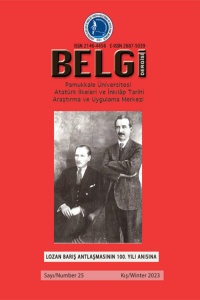Abstract
İkinci Dünya Savaşı sonunda Türkiye ve komşularının yer aldığı bölgede yaşanan bir dizi gelişme savaş sonrasının uluslararası siyasetine ilişkin önemli veriler sunmaktadır. İran ve Yunanistan’daki çatışmalarla birlikte Türk-Sovyet krizi iki kutuplu dünya gerçeği ile dünyanın tanışmaya başladığı önemli olaylar olarak kayıtlara geçti. Savaş boyunca tarafsız pozisyonunu koruyan Türkiye, savaşın bitiminde yeni dönemde nasıl bir uluslararası konuma sahip olacağı sorusu ile karşı karşıya kalmıştı. Bu belirsizliğin ortasında Sovyetlerle birikmiş olan gerilimler Sovyet hükümetinin 1925 antlaşmasını uzatmama kararı, Boğazların ortak yönetimi ve Doğu Anadolu’dan toprak talepleri ile birlikte bir diplomatik krize dönüştü. Amerika Birleşik Devletleri hem konjonktürel hem de tarihsel nedenlerle bu krize tepki vermesi zaman aldı. Diğer sorunlarla birlikte Türk-Sovyet krizinin kendisi de ABD’nin bir süredir yönetici çevreler arasında olgunlaşmakta olan dünya egemenliği fikrinin somut politikaya dökülmesinde özel bir rolü oldu. Dünya egemenliğinin somut politikaya tercümesi hem ABD’de yönetim ve kadro değişikliğini, hem de egemenlik fikrinin yeni dönemin koşullarına uygun bir doktrine dönüşmesini gerektirdi. Bu doktrinin ana unsuru “hür dünya” ile “komünizm” arasındaki karşıtlıktı. Türk-Sovyet krizi bu karşıtlığın somutlandığı ideal bir olayı teşkil etmekteydi. ABD’nin nihai olarak bu krize müdahalesi ABD’nin dünya liderliği iddiasını yüksek sesle dile getirmeye başladığı bir süreçte gerçekleşti. Türkiye’de yönetim açısından bu müdahale memnuniyetle karşılandı. Çünkü Türkiye’nin konumlanışına ilişkin belirsizlikler ortadan kalkıyor ve Türk yönetici sınıfı Avrupa’nın en büyük gücüne dönüşen Sovyetlere karşı kendine güvenli bir liman buluyordu. Makalede Mart 1945’te Türkiye ve Sovyetler arasında 1925 antlaşmasının geleceğine ilişkin yapılan ilk resmi görüşmeden Truman doktrinin ilanına kadar geçen süreç Amerikan politikasının dönüşümü ekseninde ele alınmaktadır.
Supporting Institution
Zonguldak Bülent Ecevit Üniversitesi
Project Number
2019-11391710-01
References
- Anderson, Perry, American Foreign Policy and Its Thinkers, Verso, London, 2015.
Abstract
A series of developments in the region where Turkey and its neigbors were located at the end of the Second World War, provide important insights on the post-war international politics. Along with the the conflicts in Iran and Greece, the Turkish-Soviet crisis was recorded as an important event in which the world started to meet the reality of the bipolarity. Maintaining its neutral position throughout the war, Turkey was faced with the question of what kind of international position it would have in the new period at the end of the war. In the midst of this uncertainty, the tensions that had accumulated with the Soviets turned into a diplomatic crisis, with the Soviet government's decision not to extend the 1925 treaty, and demand for joint administration of the Black Sea Straits and territorial demands from Eastern Anatolia. It took time for the United States to get involved in the crisis, for both actual and historical reasons. Eventually, the Turkish-Soviet crisis itself, along with other issues, played a special role in transforming the idea of world domination, which had been maturing among the American ruling circles for some time, into concrete politics. The interpretation of the idea of world domination into concrete policy required both a change of administration and political cadre in the US and the transformation of the idea of domination into a doctrine compatible with the conditions of the new era. The central element of this doctrine was the opposition between the "free world" and "communism". The Turkish-Soviet crisis was an ideal event in which this opposition was cyrstalized. The final US intervention in this crisis took place at a time when the US began to voice its claim to world leadership. In terms of the administration in Turkey, this situation was welcomed. It was because the uncertainties regarding Turkey's international position were eliminated and the Turkish ruling class was finding a safe haven against the Soviets, which had turned into Europe's greatest power. In the article, the process from the first official meeting between Turkey and the Soviet Union on the future of the 1925 treaty in March 1945 to the declaration of the Truman doctrine is discussed in the framework of the transformation of American foreign policy.
Project Number
2019-11391710-01
References
- Anderson, Perry, American Foreign Policy and Its Thinkers, Verso, London, 2015.
Details
| Primary Language | Turkish |
|---|---|
| Journal Section | Research Article |
| Authors | |
| Project Number | 2019-11391710-01 |
| Publication Date | January 1, 2023 |
| Submission Date | August 27, 2022 |
| Acceptance Date | December 7, 2022 |
| Published in Issue | Year 2023 Issue: 25 |


